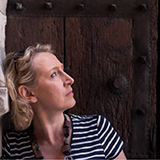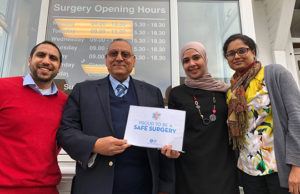 With the creation of the NHS in 1948, the UK took a huge step towards Universal Healthcare Coverage. Everyone living here could register with a GP, receiving primary care and accessing specialist treatment if needed. The UK further committed to UHC in the 2015 Sustainable Development Goals. So why are so many people excluded from healthcare today?
With the creation of the NHS in 1948, the UK took a huge step towards Universal Healthcare Coverage. Everyone living here could register with a GP, receiving primary care and accessing specialist treatment if needed. The UK further committed to UHC in the 2015 Sustainable Development Goals. So why are so many people excluded from healthcare today?
We’re lucky enough to live in a country where everyone has a right to see a doctor and be treated. You can rely on your family doctor when you are ill, patients with diseases such as diabetes or high blood pressure can see their GP to manage their condition, and via primary care, you can access specialist services such as surgery, cancer treatment, and counselling. The cost savings and good sense behind the provision of primary healthcare are widely acknowledged.
It’s incredible to think that over 300 million consultations occur in UK primary care each year, and GPs support patients from the cradle to the grave, working with them, their families, and their communities. The importance of primary care is evident to everyone in the UK, and its accessibility and universality should make us all proud.
Many people in the UK are currently excluded from accessing this vital service. People with irregular status, those who are homeless and asylum seekers are often refused registration because they cannot present proof of ID or address. This goes against NHS Guidelines and causes many to go without healthcare for years.
However, it feels like there is a shift towards overcoming exclusion in primary care, and I’m proud to see healthcare professionals in Birmingham and the West Midlands leading the way.
I have been a GP in a super diverse Birmingham for 6 years. Our city has a migrant population of over 11% and according to predictions Birmingham is only destined to become more diverse with a migrant population of over 1 million by 2030. The reasons for this are multiple and we have a long history of welcoming immigrants dating from way before the Windrush generation. Birmingham has shown strong leadership in supporting asylum seekers and migrants. Countless organisations work in the area to provide specialist help to these groups, and the Council has supported community sponsorship for Syrian refugee resettlement. However, in a time where inequality and its negative impacts on health are rising in all our communities, we need to put migrant healthcare back on the agenda.
For the past year, I’ve been working with practices and CCGs to expand and promote the Safe Surgeries initiative run by Doctors of the World. Practices that sign up to this network commit to taking steps to tackle the barriers faced by people in vulnerable circumstances who might struggle to access healthcare. This means not insisting on proof of ID or address, never asking for proof or immigration status and protecting patient information; this ensures our practices are accessible for everybody in the community. The fast uptake of surgeries all over the West Midlands was eye opening to me, and the whole of the DOTW team. I recall holding our launch event and wondering how things would turn out. Eleven practices signed up on that first night.
 In just one year, Birmingham and the West Midlands can count 73 Safe Surgeries across four CCGs, including three Safe Super Partnerships and the first Safe PCN nationally. We have also achieved fantastic coverage in some of the most diverse areas of the city, providing safe access where it is needed the most. Tracking our growing initiative shows that our most diverse CCG, Birmingham and Solihull now has 26% of practices signed up and ongoing support from Sandwell and West Birmingham CCG means momentum keeps growing; whenever I deliver a training session or presentation, new practices sign up, keen to improve their registration process and promote a more inclusive system.
In just one year, Birmingham and the West Midlands can count 73 Safe Surgeries across four CCGs, including three Safe Super Partnerships and the first Safe PCN nationally. We have also achieved fantastic coverage in some of the most diverse areas of the city, providing safe access where it is needed the most. Tracking our growing initiative shows that our most diverse CCG, Birmingham and Solihull now has 26% of practices signed up and ongoing support from Sandwell and West Birmingham CCG means momentum keeps growing; whenever I deliver a training session or presentation, new practices sign up, keen to improve their registration process and promote a more inclusive system.
The initiative is now among the “menu of interventions” recommended by NHS England and NHS Improvement to reduce health inequalities. It was also shortlisted for the General Practice Awards 2019 and the toolkit has been endorsed by the Royal College of Practitioners and the Royal College of Nursing.
Many practices were already implementing the NHS registration principles in full and have a long pedigree of providing access for all. For others, just a few tweaks or a refresh of their existing polices mean they are now stepping forward for a more inclusive primary care for all.
This access is fundamental for our patients. Migrants and asylum seekers are a young and healthy population, but often their health will deteriorate due to their living conditions and environmental factors. Because of the hostile environment rules now incorporated in our NHS, some will not have seen a doctor in years, afraid of being asked to pay huge bills or being deported by the Home Office. Others may have been trafficked or exposed to other exploitation. Some belong to unstably housed or Roma and Traveller populations who often struggle with the requirement to provide address details.
Thanks to inclusive registration practices, these patients can finally access the support they need. Challenging circumstances can lead to social isolation and marginalisation and the continuity of care offered by a GP can be a point of reference and stability. The Safe Surgeries Initiative is working toward being a supportive network with tools to signpost patients to legal and social support. Building confidence in my ability to support this patient group in their wider social and psychological needs has been key to successfully supporting patients along the road to integration. At my practice, over the years, we have supported many patients from arrival, through asylum claims, refusal and destitution, through to success in gaining leave to remain, and then with their onward journey to integration and employment.
Guaranteeing access to primary care for all takes us one step closer to Universal Healthcare Coverage. It will help patients all over the country and will have a positive impact on our public health while ultimately reducing pressures on the NHS from late and emergency presentations. As we mark the one year anniversary of Safe Surgeries in Birmingham, the network keeps growing and healthcare professionals are finally able to do what they are called to do: treat their patients without concern to housing or immigration status.
Elizabeth Bates is Doctors of the World GP champion for Birmingham and an associate GP at Cape Hill Medical Centre, Smethwick.
Competing interests: None declared.
